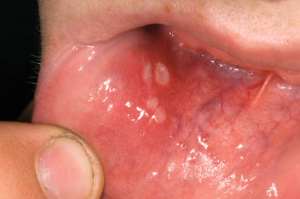
Mouth ulcers also known as canker sores are normally small, painful lesions that develop in your mouth.
These sores can appear on any of the soft tissues of your mouth, including your lips, cheeks, gums, tongue, and floor and roof of your mouth. You can even develop mouth sores on your oesophagus, the tube leading to your stomach.
Mouth ulcers can make eating, drinking, and talking uncomfortable.
Women, adolescents, and people with a family history of mouth ulcers are at higher risk for developing mouth ulcers.
Mouth ulcers aren’t contagious and usually go away within one to two weeks.
CAUSES OF MOUTH ULCERS
There is no definite cause behind mouth ulcers. However, certain factors and triggers have been identified. These include:
-minor mouth injury from dental work, hard brushing, sports injury, or accidental bite
- burns from eating hot foods
-toothpastes and mouth rinses that contain sodium lauryl sulfate
-food sensitivities to acidic foods like strawberries, citrus, and pineapples, and other trigger foods like chocolate and coffee
- reactions to certain medications
-lack of essential vitamins, especially B-12, zinc, folate, and iron
-hormonal changes during menstruation
-emotional stress or lack of sleep
bacterial viral, or fungal infections
HOW TO TREAT MOUTH ULCERS
Most mouth ulcers don’t need treatment. However, if you get mouth ulcers often or they’re extremely painful, a number of treatments can decrease pain and healing time. These include:
-using rinse of saltwater and baking soda
-placing milk of magnesia on the mouth ulcer
-covering mouth ulcers with baking soda paste
-using over-the-counter benzocaine (topical anaesthetic) products
-applying ice to canker sores
-using a mouth rinse that contains a steroid to reduce pain and swelling
You can take steps to reduce the occurrence of mouth ulcers. Avoiding foods that irritate your mouth can be helpful. That includes acidic fruits like pineapple, grapefruit, oranges, or lemon, as well as nuts, chips, or anything spicy.
Eat a healthy, well-balanced diet and take a daily multivitamin.
Avoid using hard or bristle toothbrush.
Try to avoid talking whilst chewing food to reduce accidental bites. Reducing stress and maintaining good oral hygiene by using dental floss daily and brushing after meals also may help. Finally, get adequate sleep and rest. This will not only prevent mouth ulcers, but a host of other illnesses as well.
Thank you for reading this article. Please like, share and comment your thoughts below in the comment box and follow if you have not done. Please follow for updates on health related issues.




 Togo leader Gnassingbe follows father's political playbook
Togo leader Gnassingbe follows father's political playbook
 NDC panics over Bawumia’s visit to Pope Francis
NDC panics over Bawumia’s visit to Pope Francis
 EC blasts Mahama over “false” claims on recruitment of Returning Officers
EC blasts Mahama over “false” claims on recruitment of Returning Officers
 Lands Minister gives ultimatum to Future Global Resources to revamp Prestea/Bogo...
Lands Minister gives ultimatum to Future Global Resources to revamp Prestea/Bogo...
 Wa Naa appeals to Akufo-Addo to audit state lands in Wa
Wa Naa appeals to Akufo-Addo to audit state lands in Wa
 Prof Opoku-Agyemang misunderstood Bawumia’s ‘driver mate’ analogy – Miracles Abo...
Prof Opoku-Agyemang misunderstood Bawumia’s ‘driver mate’ analogy – Miracles Abo...
 EU confident Ghana will not sign Anti-LGBTQI Bill
EU confident Ghana will not sign Anti-LGBTQI Bill
 Suspend implementation of Planting for Food and Jobs for 2024 - Stakeholders
Suspend implementation of Planting for Food and Jobs for 2024 - Stakeholders
 Tema West Municipal Assembly gets Ghana's First Female Aircraft Marshaller as ne...
Tema West Municipal Assembly gets Ghana's First Female Aircraft Marshaller as ne...
 Dumsor is affecting us double, release timetable – Disability Federation to ECG
Dumsor is affecting us double, release timetable – Disability Federation to ECG
